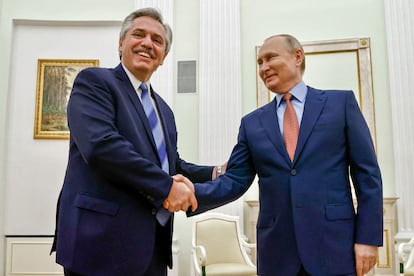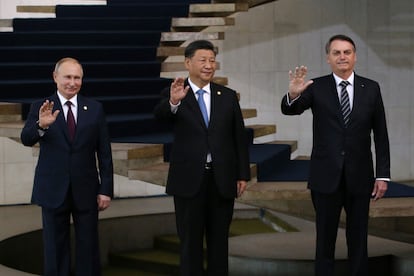Brussels prepares diplomatic offensive to stop the advance of China and Russia in Latin America
An internal document warns that the EU is losing ground in the region, while Beijing’s economic interests and Moscow’s political influence have gained a stronger foothold

The European Union is alarmed at the advance of Russia and China, in the countries of Latin America, a region traditionally linked in political and economic terms to the West. With a view to 2023, Brussels is preparing a diplomatic and commercial counteroffensive to try to reaffirm its positions in the area, according to a document sent to EU foreign ministers, to which EL PAÍS has had access. The text warns that Europe has taken a back foot in many of the 33 countries that make up the region, while China’s economic interests and Russia’s political influence have gained a stronger foothold.
The European Union has neglected its relations with Latin America for almost a decade: a summit between the two regions has not been held since 2015. The EU has been more focused on the problems of its immediate neighborhood, such as Libya, Syria or now Ukraine. China, on the other hand, multiplied its investment in the region by 26 between 2000 and 2020 “and is the first or second most important trading partner of Latin American and Caribbean countries, displacing the EU and surpassing the United States in many countries,” warns the document prepared by the European External Action Service (EEAS), headed by High Representative of the Union for Foreign Affairs and Security Policy Josep Borrell. The report underlines that 21 of the 33 countries in Latin America have joined China’s so-called New Silk Road, Beijing’s plan to expand its trade relations across the planet.
According to the document, Brussels will try to broach the distance with Latin America with a “qualitative leap” in the intensity of its relations and contact. “The credibility of the EU and its power and ability to leverage on the international scene is at stake,” warns the document. At the beginning of his mandate, Borrell set out to strengthen the EU’s presence and influence in Latin America. But the pandemic prevented closer ties. And the Russian invasion of Ukraine has revealed not only that Europe has lost a lot of ground to China, but that many Latin American countries do not share the European response to the war launched by Russian President Vladimir Putin.
“The key will be to have an agenda of measures that help Latin American countries to overcome the macroeconomic consequences of the conflict in Ukraine,” says Javi López, a MEP and president of the European delegation in the Euro-Latin American Parliamentary Assembly. López points out that the region is facing a perfect economic storm, “with rising interest rates and little margin when it comes to fiscal policy.”

“Risk of protests and political destabilization”
The EU report warns that in Latin America “the risk of social protest and political destabilization, which already existed before Covid, is real and has worsened with [population] displacement and the migration crisis.” The region has also entered a new political era, with the document highlighting the number of “anti-establishment candidates” who have come to power, such as Pedro Castillo in Peru, Gabriel Boric in Chile, Xiomara Castro in Honduras, Rodrigo Chaves in Costa Rica and Gustavo Petro in Colombia. In Brazil, the possible victory of former president Luiz Inácio Lula da Silva could culminate a “remarkable transition,” as defined by the aforementioned document, with the region moving from right to leftist governments.
With respect to foreign policy, the common denominator of the new governments “is that they are less focused on the Atlantic and more open to alternative alliances than the traditional ones” such as the EU or the US, explains an EU source. “The EU needs to systematically boost its multilateral engagement with Latin American and Caribbean countries in view of increased competition from China, Russia and others for votes in multilateral forums,” the EEAS report states.
Latin America has largely aligned itself with the West in votes on UN resolutions condemning Russia’s invasion of Ukraine. But public opinion and parliamentary expenditure indicate that this support is much more fragile. At the last summit of Euro-Latin American parliaments, held in spring in Buenos Aires, the European delegation failed to pass a statement condemning Moscow, not even when it was raised in the same terms as those approved by the United Nations.
The government of Ukrainian President Volodymir Zelenski is aware that support for Ukraine in Latin America may be waning. In response, Kyiv has intensified its efforts with contacts in the region. Zelenski has received the Guatemalan president in person and has maintained contacts with the new Boric government, with whom he discussed the possibility of sending Chilean demining experts to help Ukraine. The Ukrainian president addressed the rulers and citizens of Latin America on Wednesday through a videoconference broadcast at the Catholic University of Chile. “Russia is trying to prevent Ukraine’s contact with Latin American countries,” said the president, who also urged the region to “spread the truth” about the Russian invasion. However, Ukraine’s meetings with Argentina and Brazil, where the government has clear sympathies for Putin, have been rather cold – “correct,” in the assessment given by diplomatic sources.
A large number of Latin American countries also feel disappointed by the EU, which has shown itself incapable of finalizing the free trade agreements that have been negotiated or renegotiated for years. The pact with Mercosur – the fifth-largest economic area outside the EU, made up of Argentina, Brazil, Paraguay and Uruguay – and the updating of trade agreements with Mexico and Chile continue to be bogged down by the ratification process and by the objections of EU members such as France. The EU has already been overtaken as a trading partner by China in Argentina, Mexico, Chile and Venezuela.
López believes that, in spite of everything, the conditions are there to push Europe to build a stronger relationship with Latin America. “First, the war, because the EU needs to find allies; secondly, Europe needs to seek suppliers of hydrocarbons and raw materials, which abound on the other side of the Atlantic; and thirdly, the Spanish presidency of the EU, which sets a horizon of 18 months to program an ambitious agenda.”
The European Commission has a budget of €3.4 billion to promote cooperation with Latin America during the 2021-2017 period. Borrell’s department, according to the confidential report, believes these funds should be exploited “strategically and for maximum impact.” Brussels is also considering an investment package that, using public and private capital and credits, could mobilize €8 billion, according to the EU’s calculations. And this is not mere altruism. The EU document highlights that three countries in the area – Bolivia, Argentina and Chile – have 60% of the lithium reserves located on the planet, and Venezuela, Argentina and Brazil have important oil and gas reserves. These are hydrocarbons in which the EU is about to lose its main supplier: Russia.
Tu suscripción se está usando en otro dispositivo
¿Quieres añadir otro usuario a tu suscripción?
Si continúas leyendo en este dispositivo, no se podrá leer en el otro.
FlechaTu suscripción se está usando en otro dispositivo y solo puedes acceder a EL PAÍS desde un dispositivo a la vez.
Si quieres compartir tu cuenta, cambia tu suscripción a la modalidad Premium, así podrás añadir otro usuario. Cada uno accederá con su propia cuenta de email, lo que os permitirá personalizar vuestra experiencia en EL PAÍS.
¿Tienes una suscripción de empresa? Accede aquí para contratar más cuentas.
En el caso de no saber quién está usando tu cuenta, te recomendamos cambiar tu contraseña aquí.
Si decides continuar compartiendo tu cuenta, este mensaje se mostrará en tu dispositivo y en el de la otra persona que está usando tu cuenta de forma indefinida, afectando a tu experiencia de lectura. Puedes consultar aquí los términos y condiciones de la suscripción digital.








































